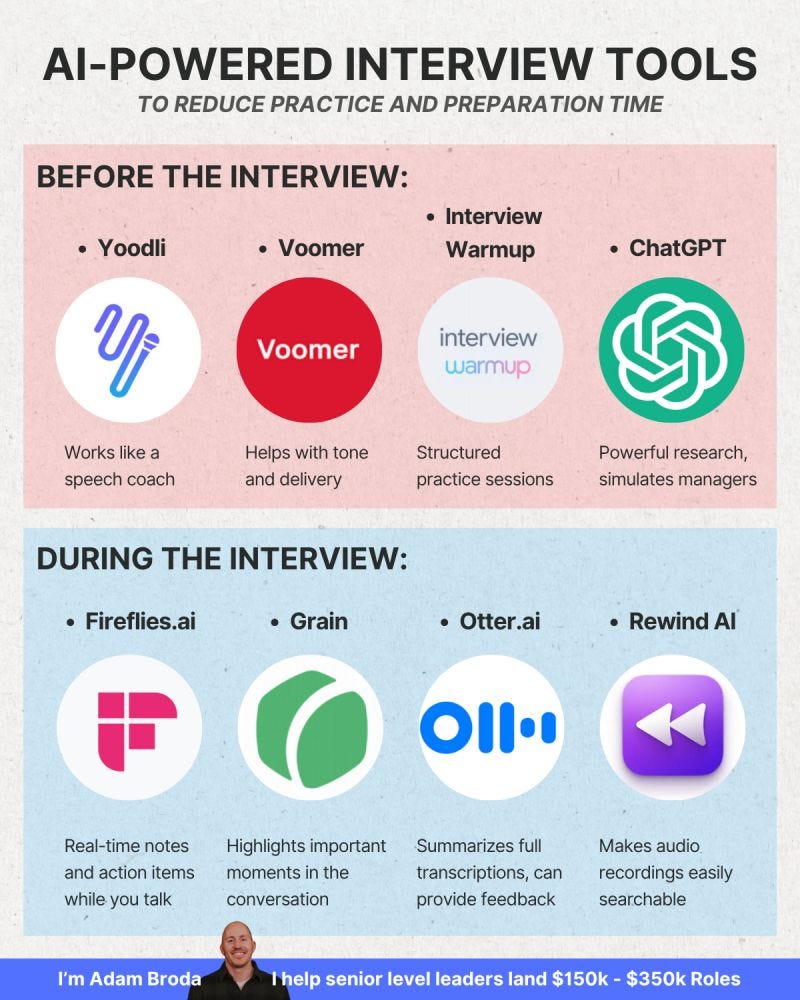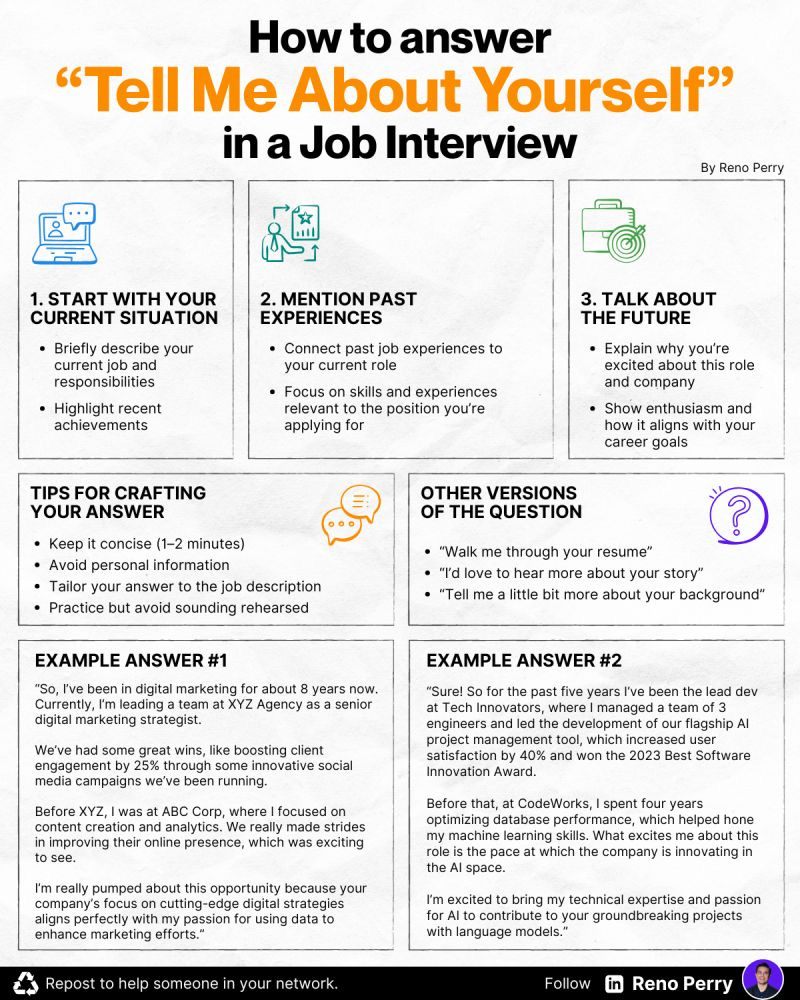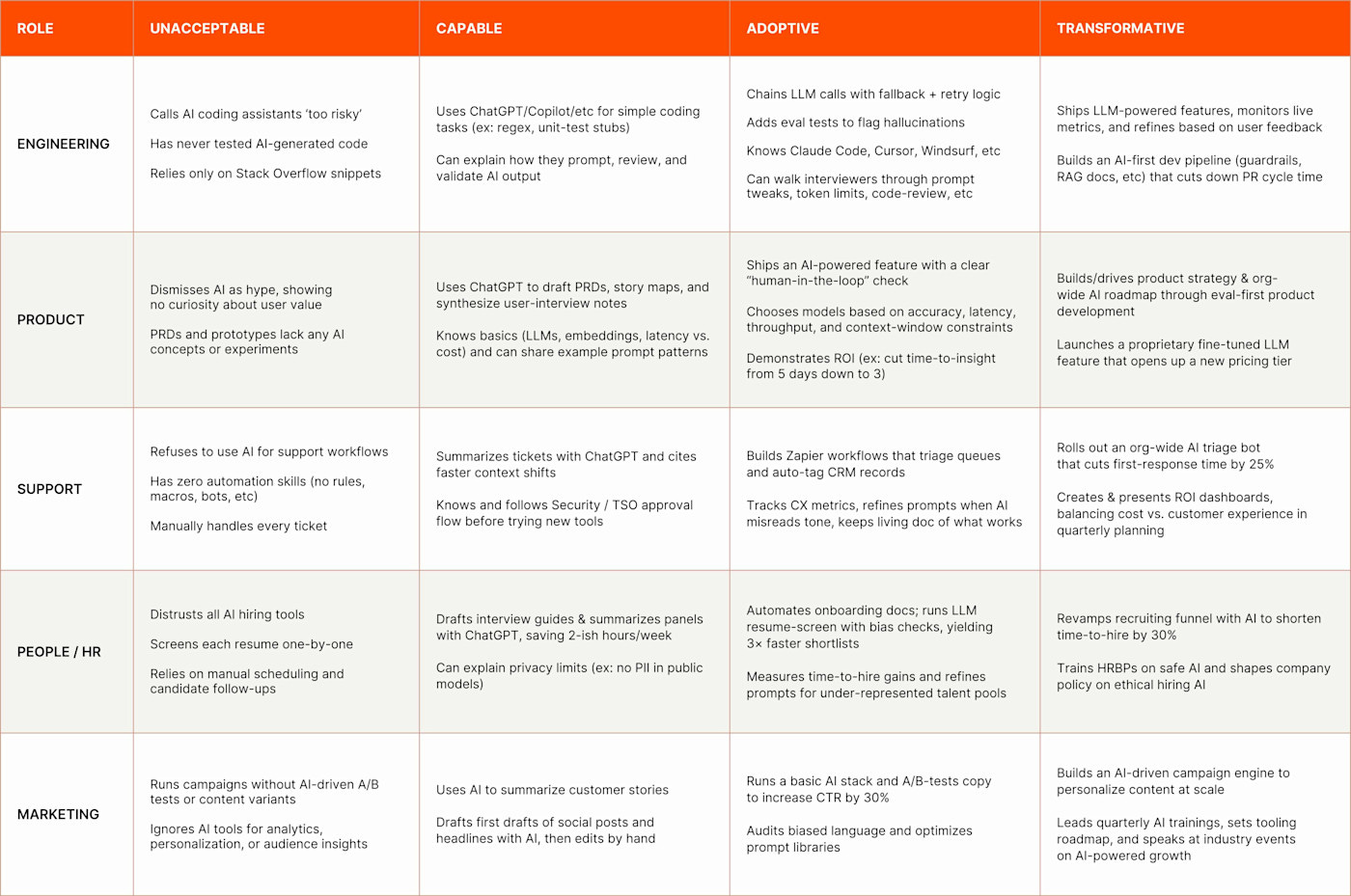The candidates who get hired do this differently
This week is about being the candidate they remember
This week is about being the candidate they remember
In this edition:
An AI-powered way to fix the #1 mistake job seekers make
A killer answer to one of the most challenging interview questions
A standout framework that turns job hunting into strategic storytelling
A shift in how companies like Zapier are hiring, with AI-first thinking
Let’s jump in.
Fix the #1 mistake job seekers make with AI
Author: Adam Broda
🔗 View the full post
Adam Broda is using AI to help job seekers land more interviews, and he shared the biggest pattern he’s seeing.
There's no better way to prepare for your interview than rehearsing your answers out loud to the questions you'll face. Preparation is key.
In interviews, most job seekers are still leading with tasks, not outcomes.
That’s a problem, because hiring managers don’t just want to know what you did, they want to see why it mattered.
Here’s a process you can do:
Take a job posting
Paste it into ChatGPT
Ask it to:
Identify the core outcomes they want
Match your achievements to those outcomes
Ask you questions about the role and ensure that you talk about the value you have delivered.
Why this works:
It puts outcomes first (the language hiring managers care about)
It tailors your answers to interview questions in 10 minutes
📌 Use this before you interview for your next role.
The interview question that trips up top candidates
Author: Reno Perry
🔗 Read the post
The question?
“Tell me what you're most proud of.”
Seems simple, right? However, as Reno points out, most candidates tend to be vague, generic, or overly humble.
What hiring managers are really looking for:
Do you understand what success looks like?
Can you communicate it clearly?
Do you take ownership without arrogance?
Use this simple structure:
“I’m most proud of [project/achievement] because it solved [specific problem]. It taught me [lesson], and it created [measurable result].”
Example:
“I led a cross-functional project to improve onboarding. It reduced ramp time by 30%, and it taught me how to align teams across different priorities.”
📌 Take 10 minutes: write your “proudest moment” using that structure. It’ll improve your interviews and your LinkedIn profile.
Currently, I’m interviewing 3-4 candidates daily, and those who turn up, communicate clearly, and demonstrate what they do tend to stand out from the rest.
Ready to outshine every other candidate?
Author: Kyle Coffelt-Thomas
🔗 View Kyle’s full post
Kyle just dropped a powerful breakdown of how to stand out by design.
It’s not about shouting louder. It’s about positioning, storytelling, and strategy.
His framework:
Find your anchor → What makes your story unique? (experience, values, niche)
Frame your value → How do you solve problems that matter to the company?
Show receipts → Proof in the form of wins, visuals, case studies
Tailor, don’t template → Use AI as an assistant, not a crutch
Here's the prompt to enter into your favourite AI model...
------------------------
I'm interviewing for my next job.
I want you to act as my executive coach and interview coach.
Here is my resume: [COPY & PASTE YOUR RESUME HERE OR UPLOAD PDF]
Here is the role I'm interviewing for: [COPY & PASTE THE JOB DESCRIPTION HERE]
Here is who I'm interviewing with: [ADD THE NAME & TITLE OF YOUR INTERVIEWER(S). YOU CAN ALSO COPY AND PASTE THEIR LINKEDIN PAGE OR PRINT IT AS A PDF AND UPLOAD IT]
Here is the interview structure: [DESCRIBE THE STRUCTURE OF YOUR UPCOMING INTERVIEW ex. 15 min phone screen, 2 hour panel interview]
The recruiter said that these are the following areas that the interviewer will focus on: [INCLUDE DETAILS ABOUT WHAT EACH INTERVIEW WILL BE FOCUSED ON. IF YOU DON'T KNOW, ASK THE RECRUITER.]
Please write 10 questions that the interviewer will likely ask during the interview(s).
Include the question, the rationale behind why they're asking the question, and an example of the best answer I can give using examples from my resume above.
Additionally, make a list of the doubts the interviewer might have that I'm the best candidate for the role based on the job description and my background and provide a way I can eliminate that doubt before, during, or after the interview.
What to apply this week:
Write a 1-paragraph summary of how you create value
Share that in a post or DM to a hiring manager
Include one real-world example with measurable impact
📌 This isn’t about being louder—it’s about being clearer, faster.
Zapier is hiring with an AI-first mindset—expect more to follow
Source: Zapier blog
Zapier just gave us a glimpse into the future of hiring—and it’s already happening.
Their approach?
“We hire for business outcomes. AI is just a tool—but people who know how to use it are the ones who’ll win.”
Here’s what they’re doing:
Rewriting job descriptions to focus on AI fluency
Prioritising systems thinkers and orchestrators over task-runners
Asking candidates to show how they think, automate, and problem-solve
What this means for you:
Learn how to prompt well (fast iteration beats perfect answers)
Utilise tools like ChatGPT to demonstrate your thought process.
Position yourself as someone who designs workflows, not just follows them
📌 AI isn’t replacing jobs. But people who know how to use AI are replacing those who don’t.
Thank you for being part of the Get Hired Toolkit community.
I'm still growing this newsletter and website, so if you know anyone who could benefit from hearing this, please share with others and spread the message.
If you have any questions, feedback, or topics you'd like covered, please reply to this email. I’d love to hear from you.
Stay motivated and continually upskill yourself to secure the next job.
Warm regards,
Darren Bush
Founder of Get Hired Toolkit
gethiredtoolkit.com | LinkedIn | Twitter




